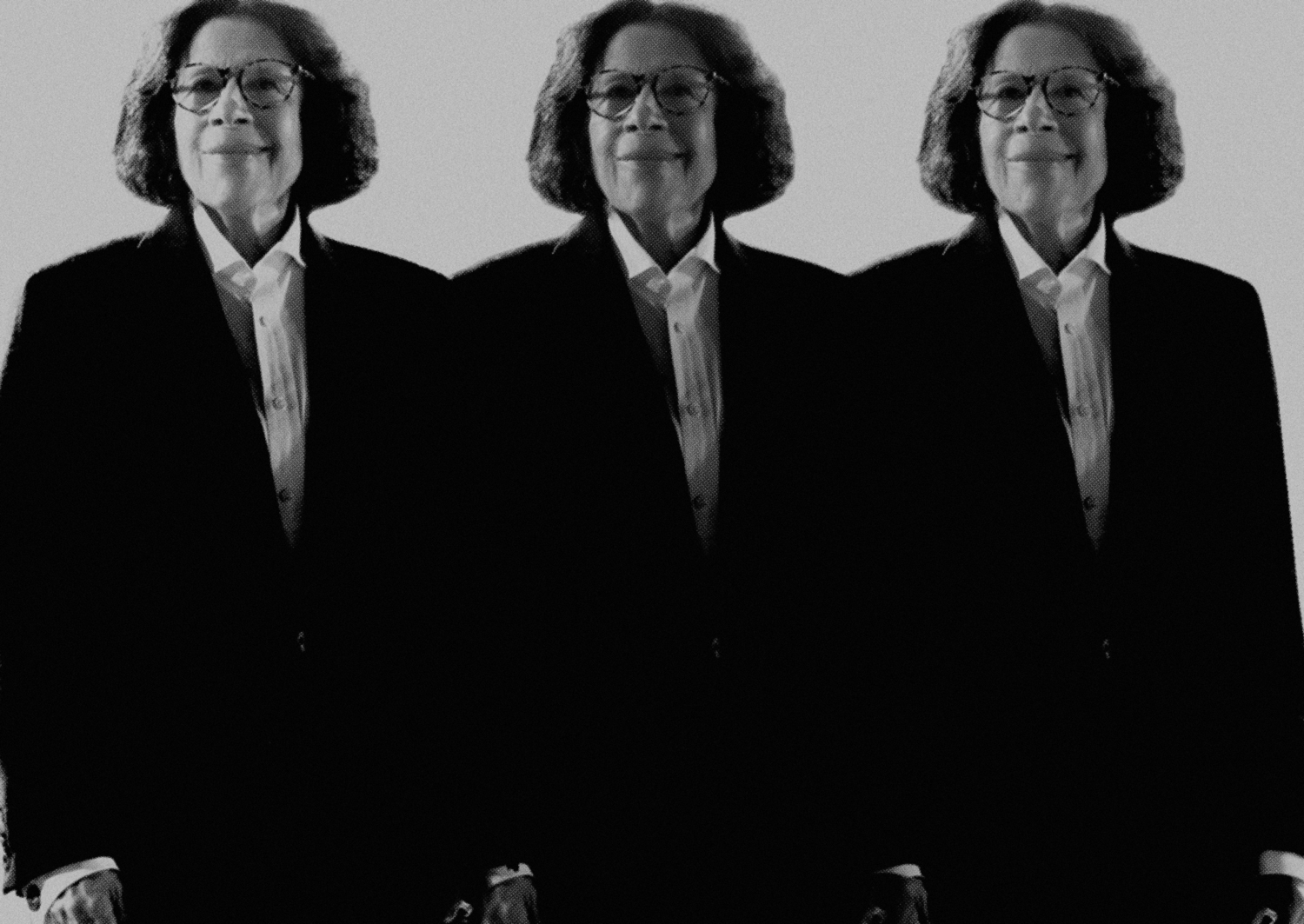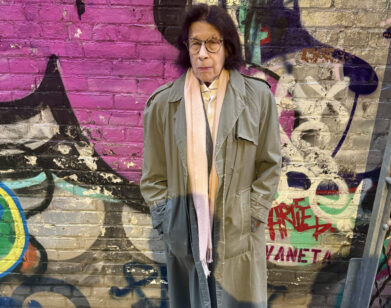metropolitan life
“I’m Not an Assassin!”: Fran Lebowitz on Not Sleeping, Not Writing, and Not Naming Names

Photo courtesy Netflix. Art by Jack Vhay.
Fran Lebowitz, the writer, cultural critic, and professional raconteur, spoke with me over the phone via landline, as she famously doesn’t own a cell phone or computer. Had COVID-19 not been the new reality, we probably would have met at some vintage New York landmark, like The Players Club or McSorley’s Old Ale House. Though a tried and true New Yorker, the author of the sardonic social commentaries Metropolitan Life and Social Studies—as well as the children’s book Mr. Chas and Lisa Sue Meet the Pandas—mostly spends her time now touring the country for public speaking engagements. She is currently the subject of the Netflix docu-series Pretend it’s a City, directed by Martin Scorsese, her longtime friend. After Public Speaking, it’s their second collaboration.
Lebowitz and I discussed her relationship with Warhol (she’s an Interview alum, after all), her disdain for bad art, taxing the tasteless, and trigger warnings, among other topics. No matter what she’s saying, it’s always imbued with her trademark wit and bold judgments.
———
BRIAN ALESSANDRO: Fran, I have to tell you, I was in China for three months for a teaching assignment in the spring of 2011 and was terribly homesick for New York, but I’d brought Metropolitan Life and Social Studies with me, and those books kept me good company. So, thank you for that.
FRAN LEBOWITZ: Oh, you’re welcome! I’m glad I can help out with these international problems.
ALESSANDRO: Pretend it’s a City is your second collaboration with Martin Scorsese, the first being Public Speaking in 2010. How did you meet?
LEBOWITZ: You know, many people ask us this and neither one of us remembers. I’ve known Marty for a really long time, and I believe it’s true that we met at a party and I know this because that’s where I met most people I knew when I was young. I’ve gone to many more parties than Marty even though he’s older than me, which is why Marty has made many more movies than I’ve written books. I did notice that after a while when I did see Marty at a party, I would spend the whole night talking to him. I can’t pinpoint it for you, though. Sorry.
ALESSANDRO: You wrote a column in Interview Magazine called “The Best of The Worst.” Is that what launched your career?
LEBOWITZ: No. I was writing for an even smaller publication. These were not really called magazines then. They were called underground newspapers, but they were neither newspapers nor were they underground. I was working for this other tiny publication called Changes, which was a quarter-fold, which I think Interview was back then, too. I was writing mostly book reviews. The woman who was writing movie reviews got an actual assignment for The New York Times and during her leave of absence I began writing movie reviews. And instantly more people were reading them. I instantly noticed that more people go to the movies than read books. I wanted to continue this, but I couldn’t because the woman came back. So, I had a friend who was writing for Interview, and I asked him if he could arrange for me to go up there and write movie reviews for them. So, I did go there. Interview then was on Union Square—hold on, I’m trying to picture it—it was on Union Square East and then it eventually moved across the street. It was the second Factory. It wasn’t the Factory with the tin foil in the West 40s. I’m not that old! It was the second one. It was after Andy [Warhol] had been shot. So, I went up in the elevator—I remember this vividly—I went up in the elevator and the doors opened, but there was a metal door behind the elevator doors and on this door was a piece of paper from a legal pad that said, “Knock Loudly and Announce Yourself.” So, I banged on the door. I heard someone say, “Who is it?” I said “Valerie Solanas” [who shot Warhol in 1968] and Andy opened the door.
ALESSANDRO: Oh … my god.
LEBOWITZ: So, I mean [Laughs] that was the beginning. I didn’t expect Andy to be there, and I didn’t go there because of Andy. I went there because there was a magazine. A lot of kids wanted to go to The Factory, but I wanted a place to publish. So, I think that Glenn [O’Brien] was the editor then, and when Andy opened the door, I said I had an appointment with Glenn O’Brien, and he said “what do you do?” and I said “I’m a writer” and that’s why they wanted me there. That’s how I got this appointment so easily, because no one my age wanted to be a writer. Everyone my age that I knew—I mean there were people at Harvard Business School, but I didn’t know them—wanted to be a musician or a filmmaker. So, I told Glenn I wanted to write movie reviews and the movie reviews that I wanted to write were funny. It was a way to be funny. It’s not that I was a film critic. I wasn’t! I said right away I wanted to write movie reviews of just bad movies and I want my own page, the back page, and I want no editing, and he agreed to everything. Of course, they paid nothing. I mean, actually, that for me was much more lucrative because they paid by the review, $10 per review, so I would do five or six reviews, and that was more than half my rent at the time. So, that’s how I started out.
ALESSANDRO: In Pretend it’s a City, you said that you and Warhol didn’t get along. Had there been an actual falling out, or was it just a personality thing?
LEBOWITZ: There was no falling out. I never talked with Andy enough in my life to ever have a fight with him. Also, it’s not my belief that Andy fought with people. It was absolutely not a good combo. He didn’t like me. I didn’t like him. And this was not extreme, by the way. There were lots of kids around The Factory mostly because of Andy. I’m not the fan type. I think that probably annoyed him, I’m guessing. I always got along very well with Fred [Hughes, Warhol’s manager] and I even got along well with Paul [Morrissey, Factory film director], who was a person who fought with everybody. There was a long period of my life where I saw Andy every night, but that was not by design. That was because we went to the same places all the time.
ALESSANDRO: What was it like suddenly becoming a New York celebrity after the publication of Metropolitan Life in 1978?
LEBOWITZ: It was really like something out of a movie because it literally did happen in one night. It was because the New York Times, you know, it is still very powerful, but what it was then was like the word of god to the entire world. Not just New York. Not just the United States. People would have arguments about anything, and the argument would end if someone said, “why did you think that?” and you would say, “well, it was in the New York Times!” “Oh, that’s it! The argument is over!” I happened to get two rave reviews from the New York Times in the same week. The Sunday Review and the daily review and that literally was it. When the daily review came out, I had no idea it was coming out, I knew nothing about it, and my editor—not my editor at the time, my original editor who had been fired in the middle of my book—called me at like seven o’clock in the morning, and I had been asleep for like forty-five minutes, and I said, “I knew that the Sunday Review was coming out because the publishers used to get it on Wednesday, and I knew it was a great review.” And then she said, “Did you see the review?” And I said, “Yes, I saw it,” and she said something about John Leonard, and John Leonard was the major book critic for The Times. And I said, “John Leonard?” And she said,”Yes, it’s in the paper this morning.” So, she said go to the newsstand—which, by the way, there were millions at the time—buy ten copies of The Times, and come over here, to her apartment, and I did not have enough money to buy ten copies of the New York Times, which at the time was like fifteen cents. So, I went to the newsstand and I asked the guy, “Could you let me have ten copies, and I’ll come back later with some money?” and he said, “No, why would I do that? Why do you want ten copies?” And I said, “I’m in the newspaper.” He said, “No, you’re not! You’re in the New York Times?! Don’t be ridiculous!” So, you know, that’s what happened, but by the time I got to my publisher’s office I was greeted like the returning Charles Lindbergh. And it was a fluke of timing that these two things happened, and also it was a fluke that the day that it came out, there was no news. In other words, there was no big news, so a lot of people focused on that.
ALESSANDRO: Very fortuitous timing. In both Public Speaking and Pretend it’s a City you discuss with Scorsese how New York has changed for the worse. Gone are CBGBs, Kim’s Underground, myriad cafes and restaurants and landmarks. Do you think a city has a responsibility to protect establishments that have historical or cultural significance? Have the historical society and New York’s citizens dropped the ball?
LEBOWITZ: Well, you know, the thing is, New York City has done more than the country has done. This country has never cared about this. This country gives zillions of dollars to farmers to not farm, okay? [Laughs] Someone ought to look into this because, surely, we have had enough farmers not farming for enough years to kind of give this up. I do think that it’s not so much a matter of preservation because that’s architectural. In other words, building preservation is not good in New York, and it’s gotten worse and worse, because the forces of preservation are never as strong as the forces of development. Not every old building is worth saving. I agree with that. You know, I just have always wondered why, it’s like an unwritten law that no matter how awful the building is that they take down, a worse one will rise in its place, and it’s not that there aren’t any good architects. There are many good architects. It’s not like, where are we going to find an architect? There’s lots of them. Clubs and bars and things like that, to me, is a different story because people’s attachments to those places really have to do with their youth, so it’s just like popular music. People never stop loving the popular music of their youth. Very many people say, oh the music was much better ten years ago or twenty years ago or forty years ago, but that isn’t really true. What’s true is that it’s much more fun to be twenty than forty. Or sixty. So, things like clubs, there are always going to be clubs because there are always people who are going to be twenty! People are always going to want to go out. There is always going to be music because music is intrinsic to being human. New ones will appear. A lot of those things are meaningless outside the context of their era. So, you may wish they were still there because you were there at the time, but they would not be meaningful to someone younger than you.
ALESSANDRO: That’s fair.
LEBOWITZ: You know, there are other things that I definitely think, like cultural institutions the Metropolitan Opera and the New York City Ballet, of course should be highly subsidized by the public. They are very important. They’re not just important if you go, and that’s the thing that really bothers me. You don’t go to the opera—I don’t go to the opera, by the way, I don’t like the opera, I know it’s against the law—but I was devastated when the Metropolitan Opera closed because it is extremely important to New York City and to the culture that there is the Metropolitan Opera. I very often consider myself the designated taxpayer in New York, so I pay a lot in taxes, and have always paid a lot of taxes, and please give my tax money to that! Please don’t build another baseball stadium! I never go there!
ALESSANDRO: Same!
LEBOWITZ: And which, by the way, are lucrative businesses that don’t need that money! The museums, places like that, they should get much more public money.
ALESSANDRO: With so much money coming into New York City over the past twenty-five, thirty years, is there a way to stanch or undo the gentrification?
LEBOWITZ: Well, it turns out, there is! Have a pandemic!
ALESSANDRO: [Laughs] I was just going to ask you about COVID-19.
LEBOWITZ: It turns out that what would really work is something that we never thought about. It turns out that if you have a pandemic, it will cause real estate values to plummet. Now, that is a very bad way for that to happen. Especially since I bought an apartment way beyond my means three years ago!
ALESSANDRO: That’s right! You were just saying that in the series.
LEBOWITZ: At the height of the market! So, I could have probably predicted that real estate values would drop because that always happens to me.
ALESSANDRO: ‘Buy-high, sell-low Lebowitz!’
LEBOWITZ: That’s right! So, I think there will be some upsides to this, and when I say that, I don’t mean that it’s worth it. I don’t mean it’s worth it to have people die in order for this to happen, but since it’s happened, it will be a good thing for New York, not a bad thing. It is a good thing that the city is not so shockingly, prohibitively expensive that only bankers can live in New York. It’s ridiculous! I already know kids who have moved here. And by the way, it’s much cheaper to live here now, but it’s much more expensive than most places, and that’s always been true of New York. It is an opportunity to get rid of some of the people who decide that having a backyard is better than living in New York and it is a good opportunity for people who could not have thought about coming here to now come here.
ALESSANDRO: So, you think COVID-19 will ultimately be good for the New York art scene?
LEBOWITZ: Well, I hate to put it that way. It’s like saying a nuclear war will be good because then you’d be able to see the sunsets better. [Laughs] I think it will be an advantage to the city to have the city be less expensive, and by the way, I know for a fact that it will not last. It will become too expensive again, so if you have a chance, get in here now. And those people who couldn’t come because it was so expensive are the people who make New York. It is not bankers who make a culture. It’s very important that there’s this opportunity, and they should take it.
ALESSANDRO: I recall you saying in Public Speaking that most of the great artists and writers of our time died during the AIDS crisis, thereby allowing lesser talents to prosper. You also said that much of the discerning audience—those who safeguard the culture against bad art— died during this time of AIDS, as well. Who now is on the hook for safeguarding the culture against bad art?
LEBOWITZ: Sometimes I feel like it’s just me.
[Both laugh.]
LEBOWITZ: You know, one thing I notice is that people who are younger than me, which is pretty much everyone, they’re much less judgmental and that they have been brought up to be that way. They’ve been brought up to think that making these kinds of judgments is akin to immorality.
ALESSANDRO: You’re so right.
LEBOWITZ: “It’s not nice. It’s not fair.” You know, “everyone should have a chance, everyone is good, so, that’s true of society.” Yes, society should be fair, yes, society should give everyone a chance, it should be more equal, but it’s not true of the culture. The culture is not the society. We have way too much democracy in the culture and way too little in the society. But in order to make these judgments, you have to agree or believe that some things are better than others. Not some people are better than others. Not some genders are better than others. Not that some races are better than others. But that some writers are better than others. Some painters are better than others. Some composers are better than others. Because of course it’s true. It’s very interesting in this country that people are willing to say that some athletes are better than others. The whole world of sports is based on who is the best. The word ‘elite’ is used among athletes with admiration. “These are the elite athletes. They’re going to the Olympics!” But it’s always a put-down when they talk about artists. Truthfully, the reason for that, I think, is because sports are objective. They’re not someone’s opinion. Yes, this is the guy who hit the most balls or got the most baskets, you know, I know nothing about sports. No one can say, no, the other guy who had fewer home runs—he’s a better baseball player. But judgments about music or writing or whatever, they’re purely subjective. You have to know a lot to make these judgements, and that makes people think you are arrogant because you think you know more than other people, even though it’s a fact that some people know more than other people.
ALESSANDRO: Of course. To those points, what to you constitutes bad art, bad literature?
LEBOWITZ: Well, that’s too broad. I couldn’t say. I could only discuss book by book. One thing I would tell you, there is, to me, a tremendous distinction between an artist and an entertainer. And that distinction has pretty much been erased. To me, the difference is that an entertainer thinks of the audience first. You know, “will they like this?” And an artist does not. I don’t care who you are, everyone wants their work to be liked because that’s a human trait. Also, it’s a commercial desire, but entertainment is made in order to sell it. The point of it is to sell, and the point of the people who work in entertainment is, how many people will like this? We need the most people to like this.
ALESSANDRO: Speaking of your own work, you’ve discussed your “decade’s-long writer’s block” quite a bit and attributed it to your great regard for the written word. What is happening with Exterior Signs of Life? The premise is brilliant and so spot-on about our current culture.
LEBOWITZ: Well, it’s called Exterior Signs of Wealth.
ALESSANDRO: Oops. Sorry! ‘Wealth!’
LEBOWITZ: Right, not ‘life.’ I make the distinction between wealth and life, although everybody else in the country does not, okay? [Laughs] I still have [writer’s block], and I would say it’s a little bit less than half-finished. Of course, I still have it because I imagine that someday I might finish it. Exterior Signs of Wealth, the title came from a French tax that they may or may not still have. I think the direct translation is “external display of riches” or something. Because in France, this may no longer be true, but at the time, you were taxed on certain assets by how much you displayed them—so if you had a Picasso, say, and it was in your living room, you paid more tax on it than if it was in your bedroom, the idea being that more people would be in your living room than in your bedroom, although that’s not at all my experience of Paris. [Laughs] Like in England, they used to have a window tax on buildings, houses, because windows were very expensive, so if you had a lot of windows, it meant you had a lot of money. I don’t know if they still have this tax, but I think it’s an excellent way to tax because one of the irritating things about rich people is showing off. So, this causes them to show off less.
ALESSANDRO: How about your other book, Progress?
LEBOWITZ: I am really not working on it, I would have to say, although I still have it.
ALESSANDRO: Has Public Speaking and Pretend it’s a City changed anything for you?
LEBOWITZ: More people watch movies than read books. This is generally the case. And it’s a completely different form. I mean, they were very far apart in time.
ALESSANDRO: Yeah, ten years.
LEBOWITZ: And Pretend it’s a City came out in the middle of a pandemic, so it’s a little harder to tell. I’ve certainly heard from a lot of people who saw it. The difference is that Public Speaking was on HBO and Pretend it’s a City is on Netflix, and so Netflix is all over the world, and the day after this was released or dropped or whatever they call it, the first call I got was from Doha, from a friend of mine. The second call I got was from Saigon. The third call was from Geneva. This is something that would never happen if not for Netflix. It wouldn’t have happened with HBO and it wouldn’t have happened in a movie theater, even if you had a giant movie, which, of course, I didn’t, and I won’t. It doesn’t open all over the world on the same day! So, this is a unique experience for me.
ALESSANDRO: In Pretend it’s a City, you discuss Edith Wharton and trigger warnings, and James Levine and cancel culture. To what do you attribute these trends? Are they detrimental to art?
LEBOWITZ: Well, I actually didn’t know about trigger warnings until about several years ago, and I was speaking at a college and someone mentioned them, and actually, a member of the audience, a student, had to explain it to me. I wasn’t aware of it, but now I’m aware of it. Here’s the thing about these things that people call political correctness or whatever. These are extremes. In other words, they can become incredibly silly. You know, some of these things seem ridiculous to me. However, I know they came from some blatant horrible stuff. But the thing is, human beings—they never know when to stop. Yes, some of these things are absurd. The thing that Marty talked to me about in Pretend it’s a City, which was taken from a New York Public School reading test [an Edith Wharton passage about women losing their looks as they age,] this is totally ridiculous. However, the problems that women have on being judged on their looks, that’s a huge thing. So, it would be better if humans could pay attention to the big things. They try to fix these little things because they’re free and easy to fix, so that’s why they change these things like trigger warnings, and you know, maybe a little girl taking this reading test of Edith Wharton maybe might have the idea that she might be judged by her looks. I got bad news for you, you’re going to be judged on your looks. Fix that!
ALESSANDRO: You are very thoughtful when appreciating writers and artists from the past and very critical of contemporary writers and artists. Would you name a contemporary artist or writer who you think is producing work that will endure?
LEBOWITZ: Oh, many! I can’t imagine saying I don’t like specific ones. I do not do that. I do not name names. I’m not an assassin! I also know that it’s just as hard to write a bad book as it is to write a good book. The only difference is talent! I don’t care if you’re the most talented writer or the least talented writer. It’s very hard.
ALESSANDRO: Yes, it is!
LEBOWITZ: There are several good writers. Very good writers. I have my favorites and I have my least favorites. You can’t guess which writers are going to endure. You really can’t. And also, books and writers go through these long periods where they go out of favor—and when I say long, I mean 50 years, 100 years—and all of a sudden there’s a revival. If I could see that far into the future, I wouldn’t keep buying the wrong lottery tickets.
ALESSANDRO: You’re a voracious reader. How many books do you average in a year?
LEBOWITZ: Generally, not during a pandemic, I probably read two or three books a week. In the pandemic, there certainly were days where I read two books. And part of it is because I don’t sleep. A day for me could be twenty hours long.
ALESSANDRO: I’m good friends with Edmund White, and he’s always devouring books whenever I visit, reading several at once.
LEBOWITZ: Yeah, well, Ed is older than me. Few people are. A big habit of reading is a little more common in older people. How old is Ed now?
ALESSANDRO: He’s 81.
LEBOWITZ: I just turned 70. So, I’m much younger! I’m a generation beneath Ed White! There are lots of people, especially people who lived in small towns or small cities, who did not live in New York, who got their whole world from the public library, and that was the place you went, that’s where the world was. Now, people who are young, they have the internet. I don’t think the smallness of their life sends them so much to the library.
ALESSANDRO: Charles Bukowski said, “Isolation is a gift. Everything else is just a test of your endurance.” Do you agree?
LEBOWITZ: [Laughs] That’s unusually witty for him! I think that there’s a lot of truth in that.






